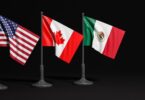Last month a number of a reputable bankers met at the World Economic Forum in Davos, Switzerland, discussing the future of banking and the transitions they are making to adjust to more a climate-centric economy forward. During the conversation a number of the guests wanted to place great emphasis on the service and care they bring to their customers, and why too much regulation gets in the way of that many of times.
The session was called “Are Banks Ready for the Future?” The WEF wrote: “While the broader ripple effects of April’s banking crisis in the US were contained, risks to the health of the sector persist. What measures need to be put in place to ensure that banks are primed to face an uncertain future, while rebuilding trust in the system?”
The speakers included:

A big part of the conversation had to do with promising resiliency for people who might be cautious about the state of the international banking sector. However, not much was really explained as to how resiliency would be created and maintained.
Where the bulk of the discussion went was the transition to more climate-based investing and regulations from the government. It was the IMF’s Gopinath who said “there’s a very large need for climate finance,” and claimed that by 2030 another $40 trillion needs to be invested in this space.
Interestingly enough the conversation actually got a bit chippy at one point, when Gopinath brought up how the national regulator’s have a big role to play in this in trying to work with the banks to aid in the transition. This appeared to touch a nerve with some of the panelists, and the irritation with the regulators ended up becoming the main topic instead.
For example, leading off of that, JPMorgan-Chase CEO Mary Erdoes tried to emphasize just how much their bank manages, and just how important they are, and why customers should trust them. She said in a rant:
A bank works for its shareholders and for its clients, and of course it’s employees and its communities; but in the bulk of our job is to be a fiduciary for our clients, where we’re helping them invest and to [provide] help for our shareholders, and so it’s not like we have a target for climate Investments or climate financing. We’re helping our clients to do that.
[And] it gets to the point of regulations, which we were talking about before, who in their right mind would make regulations more onerous on any institution to fund a wind or a solar company, than it would to finance a social media company? […] Putting these regulations out there’ sort of this sense that like if you’re big you must be bad, or I must have to sort of control you – all we are is a reflection of our clients. We’re just trying to help our clients, so we’re trying to do the best we can. We’re trying to do it in a controlled manner. […] I mean the reason that people keep turning to the institutions that are up here on this screen are because this is serious stuff. This is the safety and soundness of financial institutions, but it’s the safety and soundness of your money.
Erdoes went on to explain how attempted hacks made against JPMorgan-Chase are in the tens of billions daily, and therefore they invest multibillions annually to protect their assets and money, bragging that they have more engineers than Google or Amazon to make sure these assets are protected. The bank CEO used this as an example as to why people should trust them, demonstrating their care for people’s money.
And you think about who’s going to invest the money, to protect your assets to make sure when you’re moving them around the world, when you’re going to make the wind or solar investment, and it’s got to hop out of your bank and into a company, is it going to make it there from point A to point B, are you going to do it in the right way?
Is someone going to be there to protect you if somebody hacks in, can we see it, can our systems do more than our brain can do. The AI work that we do in our company, we have 62,000 technologists in our company, we have more engineers than Google or Amazon.
Why? Because we have to, and we want to, and you want us to. You need us to protect that, and so all of this is an ecosystem where you you care deeply – again it goes back to a doctor or a hospital you care deeply about, who it is that’s there to take care of you.
The host, Sara Eisen from CNBC, questioned if the regulators where making this harder from them to do. Erdoes essentially said yes, questioning the goal of the regulators, claiming that the different standards they provide bigger banks like JPMorgan-Chase versus the regulations giving to smaller ones, contributed to the rift that occurred in 2023.
Gopinath pushed back against some of Erdoes’ opinion and reminded her that crash in 2008 is a reason why tighter regulations exist now, of which, she claims, have prevented any other major crashes since then. Gopinath argued greater supervision was really needed, which lacked in 2023, citing the failure of Silicon Valley Bank and Credit Suisse as the examples.
For further context and see the whole debate, watch the chat here:
AUTHOR COMMENTARY
Having sat through this whole interview there are so many other things I could have written out, but that would have been tedious and hard to keep consistent without getting stale. So, if you want full context and you have time to kill, watch the interview to see how these greedy dogs talk.
As for what Erdoes said, I wanted to highlight this because the theme for this year’s WEF meeting was “rebuilding trust,” and she did her best to really hype-up JPMorgan Chase.
Erdoes, for those who don’t know, is quite ‘powerful’ and influential, as not only was she a graduate from the Jesuit Georgetown University, she also helps host the Roman Catholic Al Smith charity dinners for the elections, alongside Cardinal Timothy Dolan. As the old adages go, follow the money; and, all roads lead to Rome. I mean, even Gopinath from the IMF wore a purplish jacket, and the moderator Eisen whore a scarlet dress. It’s right there in front of you (Revelation 17).
[4] And the woman was arrayed in purple and scarlet colour, and decked with gold and precious stones and pearls, having a golden cup in her hand full of abominations and filthiness of her fornication: [5] And upon her forehead was a name written, MYSTERY, BABYLON THE GREAT, THE MOTHER OF HARLOTS AND ABOMINATIONS OF THE EARTH. Revelation 17:4-5
Earlier in the discussion, she reminded people that JPMorgan-Chase controls a great deal of wealth:
[We are] incredibly blessed to have the clients that we have. We bank house half the households in the United States of America, we bank 90% of the of the Fortune 500 clients, we we share many clients with with my colleagues on stage, and we’re fortunate enough to work with clients where we say, ‘we want to lend you money. but we want to do this in the right way.’
SEE: Banking Bust: Moody’s Downgrades Credit Ratings Of JP Morgan-Chase, Wells Fargo, And Bank Of America
I highlighted some of Erdoes’ statements in this report, in light of her connection and the size of JPMorgan-Chase, to demonstrate how these people act and think, and how they are desperate for people to stay sucked into the system. The word “usury” has fallen out of common use, but it basically means interest. But usury make it clearer as it partially defines itself: “use” – someone is using you, your money or assets.
He that putteth not out his money to usury, nor taketh reward against the innocent. He that doeth these things shall never be moved.
He that is surety for a stranger shall smart for it: and he that hateth suretiship is sure.
Psalm 15:5; Proverbs 11:15
Erdoes wants you trapped in the system and does not want you debanking, which is what has been quietly happening since 2020 especially. Make no mistake about it: I have been warning that more bank collapses WILL assuredly happen in 2024 and 2025, and JPMorgan-Chase stands to make even more money and wealth than they already have, as the system consolidates.
Keep your money out of the banks. Keep only the necessary amounts needed to pay bills and buy online, but keep most of it hidden away and protected that way.
[7] Who goeth a warfare any time at his own charges? who planteth a vineyard, and eateth not of the fruit thereof? or who feedeth a flock, and eateth not of the milk of the flock? [8] Say I these things as a man? or saith not the law the same also? [9] For it is written in the law of Moses, Thou shalt not muzzle the mouth of the ox that treadeth out the corn. Doth God take care for oxen? [10] Or saith he it altogether for our sakes? For our sakes, no doubt, this is written: that he that ploweth should plow in hope; and that he that thresheth in hope should be partaker of his hope. (1 Corinthians 9:7-10).
The WinePress needs your support! If God has laid it on your heart to want to contribute, please prayerfully consider donating to this ministry. If you cannot gift a monetary donation, then please donate your fervent prayers to keep this ministry going! Thank you and may God bless you.








These monsters will never get the trust back. Now we know who the sell-outs of humanity are!
Your definition of ‘usury’ made me think of this: usury is when someone pays a set fee to use an asset you’ve loaned them by that agreement. The Jews weren’t permitted under Mosaic Law to charge fellow Jews usury. That went out in 70 AD, & it was fiat that threw the monkey wrench into that in our time: fiat backed by less & less & less….until having no absolute value at all.
–
‘Transfer of assets’ accomplished.
–
Sodomite Keynesian ‘economics’. Back when that was first being promoted, many objected & pointed out where it must end due to the depravity of mankind. Of course, they were pooh-poohed & laughed out of town, & in the end, few could resist getting involved in the obscene profits possible at the beginning of such a scheme.
–
Usury’s kind of a fixture in the antichrist world & amongst the nations, though. Obviously with Rome & her spirit at the helm of the thing. Scarlet & purple, thank you for that insight on Erdoe & the Al Smith charade. I did not know that. Nice hand signal, don’t you think?
–
No doubt the original Jew-Catholic backscratching deal was over charging usury. The Jews could charge Gentiles usury, the Gentiles claiming to be Jews could charge usury of real Jews. Of course, it was all lop-sided, & if certain Jewish houses grew a little too powerful, or a new Pope had an especially covetous eye….then it was time for a pogrom or a crusade.
–
Kind of like we’re seeing today, & may it be that last.
–
I think it may have been Bryan D. brought it up, he couldn’t remember the citation, but he remembered being taught that ‘if something is free’, then ‘YOU are the product.’